TRANSPORT
Page 22

If you've noticed an error in this article please click here to report it so we can fix it.
Cleaner vehicles The Department of Transport has launched a scheme designed to help businesses cut back on carbon dioxide emissions, enabling sizeable savings to be made on fuel bills.
The initiative, known as "Motorvate", will offer advice from energy, transport and environment experts on a range of subjects such as buying greener vehicles and achieving better vehicle performance.
The registration fee for Motorvate will be in the region of .t 5oo-fi,000, depending upon the size of your fleet.
Contact Motorvate via its web site, www.greenerfleetorg.uk, or on o8o8 too 9100.
The DOT has also published the final report of the two-year-old Cleaner Vehicles Task Force. The Way Forward looks at the future of environmentally friendly fuels and fuel economies, and is available from DOT Free Literature. Contact: 0870 122 6236.
COMPANY
Change to Companies Act New legislation has come into force amending provisions in Part VII of the Companies Act 1985 concerning the exemption of some smaller companies from having their annual accounts audited. Small companies face a turnover limit, under which they will be exempt from the audit. This limit has been increased from i35o,000 to inn (as has the limit for a group to qualify as a "small" group).
The regulations also amend the definition of a dormant company (section 249AA(4)-(7)). Dormant companies (as defined) no longer have to pass a special resolution in order to qualify for exemption from auditing. Instead, they will qualify automatically provided that io% of members do not request an audit.
The amendments will apply to annual accounts and reports covering financial years ending two months after the date the regulations come into force (26 May 2000).
Copies of the Companies Act 1985 (Audit Exemption) (Amendment) Regulations 2000 (SI 2000 No 1430) are available for (zoo, from the Stationery Office.
Electronic Communications Act
The Electronic Communications Bill has now received Royal Assent. All parts of the new Act are now in force, with the exception of Part I; Part II, Section 7 (electronic signatures and related certificates); and Part III, Sections II and 12 (telecommunications licences).
Copies of the Electronic Communications Act cost 1.4.00 from the Stationery Office.
EMPLOYMENT
Minimum wage The Inland Revenue has produced two new codes of practice designed to ensure that it conducts a "thorough and sympathetic enforcement" of the national minimum wage (NMW). One code applies to employers, the other to employees. They explain how the Revenue will act if workers who believe they are not receiving the NMW complain; they also cover the inspection of company records to ensure compliance with the legislation.
The codes are available on the Revenue web
site at vvww.inlandrevenue.gov.uk. Hard copies are free from the NMW helpline. Contact: 0845 600 0678.
Discipline and grievance procedures The Advisory, Conciliation and Arbitration Service (ACAS) is issuing a code of practice on disciplinary and grievance procedures in the workplace. It is expected to come into force on 4 September 2000.
Copies of the draft code can be found on the DTI's web site at www.dti.gov.ukierirtba.htm.
TAXATION
NIC consultation The Inland Revenue is consulting on changes to rules designed to simplify the administration of National Insurance Contributions (NICs). The proposals would give employers: • A clear view of the Revenue's power to conduct inspections; • A simpler calculation system with regard to employees working abroad on secondment; • A new procedure for dealing with NIC arrears; and • More time to deal with irregular payments of earnings.
As well as the proposed simplifications, the Revenue has also decided that two major studies will take place over the next year, on VAT and Corporation Tax in the non-financial sector. The studies will be part of a four-year programme of research into tax compliance costs that cause the most difficulty for the business community. Work on the projects is expected to start immediately.
Online self-assessment The Inland Revenue's online tax self-assessment (SA) service introduced new features at the end of June zoo°. The service will now: • Allow customers to use compatible commercially available personal finance software; • Provide the Revenue's own free software for use with the return; • Allow the customer to send a completed SA tax return over the Internet; and • Give immediate recognition of the receipt of the tax return.
Further information is available at: www.inlandrevenue.gov.uk/e-tax/index.htm.
Copies of Simptifiing National Insurance Contributions for Employers—A Technical Discussion Paper are available on the Revenue's website at wwwinlandrevenue.gov.uk.
HEALTH & SAFETY
When is help required?
The Health and Safety Executive (H SE) has published a leaflet describing when and how employers should seek information on health and safety issues. The leaflet includes a checklist that could help employers identify any health and safety issues. In addition, an annex of contacts is included along with other advice concerning when and how to seek help from outside the company.
Need Help on Health and Safety? combines and updates two previous leaflets—Selecting a Health and Safety Consultancy and Need Advice on Occupational Health? It is available free from H S E Books.
Contact: 01787 881165.




































































































